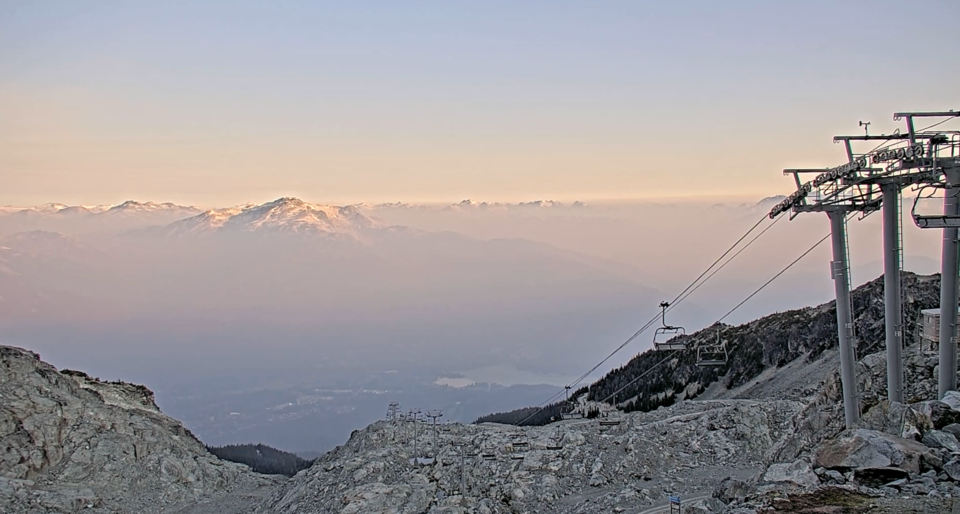It's about to get very smoky in Whistler.
According to Environment Canada, air quality in the resort is forecast to worsen significantly on Thursday and into Friday, with forecast maximums topping out at 9/10 or even 10/10—high risk.
A special air quality statement is in effect for the resort.
"Numerous regions across B.C. are being impacted or are likely to be impacted by wildfire smoke over the next 24-48 hours. Smoke haze will be present across the majority of the B.C. landscape and can be highly variable," it reads.
"During a wildfire, smoke conditions can change quickly over short distances and can vary considerably hour-by-hour. Monitor the situation for any wildfires near your area at EmergencyInfoBC. Follow all emergency announcements relevant to your location."
You can check for B.C. air-quality warnings here.
According to firesmoke.ca, almost the entire province of B.C. is covered in smoke, with the worst air quality found in the Lower Mainland as of Thursday morning.
"As smoke levels increase, health risks increase. Limit time outdoors. Consider reducing or rescheduling outdoor sports, activities and events. You may experience mild and common symptoms such as eye, nose and throat irritation, headaches or a mild cough. More serious but less common symptoms include wheezing, chest pains or severe cough," the statement reads. "If you think you are having a medical emergency, seek immediate medical assistance. People more likely to be impacted by outdoor air pollution, including people aged 65 and older, pregnant people, infants and young children, people with an existing illness or chronic health condition, and people who work outdoors, should reduce or reschedule strenuous activities outdoors and seek medical attention if experiencing symptoms.
"When indoors, keep windows and doors closed as much as possible. When there is an extreme heat event occurring with poor air quality, prioritize keeping cool. Protect your indoor air from wildfire smoke. Actions can include using a clean, good quality air filter in your ventilation system and/or a certified portable air cleaner that can filter fine particles. If you must spend time outdoors, a well-constructed, well-fitting and properly worn respirator type mask (such as a NIOSH-certified N95 or equivalent respirator) can reduce your exposure to the fine particles in the smoke."
If you need to escape the smoke in Whistler, check out the Meadow Park Sports Centre or the Whistler Public Library.
Even with reduced exposure, there can still be risks to health, Environment Canada notes.
"Check in on others who are in your care or live nearby who may be more likely to be impacted by outdoor air pollution. Always follow guidance from local authorities. Learn more at canada.ca/wildfire-smoke. For more information on current air quality, visit gov.bc.ca/gov/content/environment/air-land-water/air. Visit airhealth.ca for information on how to reduce your health risk and your personal contribution to pollution levels, as well as for current and forecast AQHI values."
The local fire danger rating is currently extreme. No fires of any kind are allowed in Whistler now until Sept. 15, no matter the fire danger rating—including campfires and fireworks.
The BC Wildfire Service is showing no new fires near Whistler this morning, though the small blaze west of the resort on Mount Cayley is now listed as being held at 0.88 hectares.
The Bastion Peak fire on the west shore of Lillooet Lake, southeast of Pemberton, is listed at 66 hectares as of Thursday morning. The out-of-control fire is believed to be lightning-caused.
Two other out-of-control fires are still burning near Pemberton from last week's lightning storm, including a 0.009-hectare fire on Mount Currie, discovered yesterday, and a 0.5-hectare blaze near Rutherford Creek. Further west, in the Elaho Valley, two massive fires are also burning out of control—one at more than 415 hectares, and another at 238 hectares.
Stay tuned to the BC Wildfire Map for the latest, and check back with Pique for updates.




